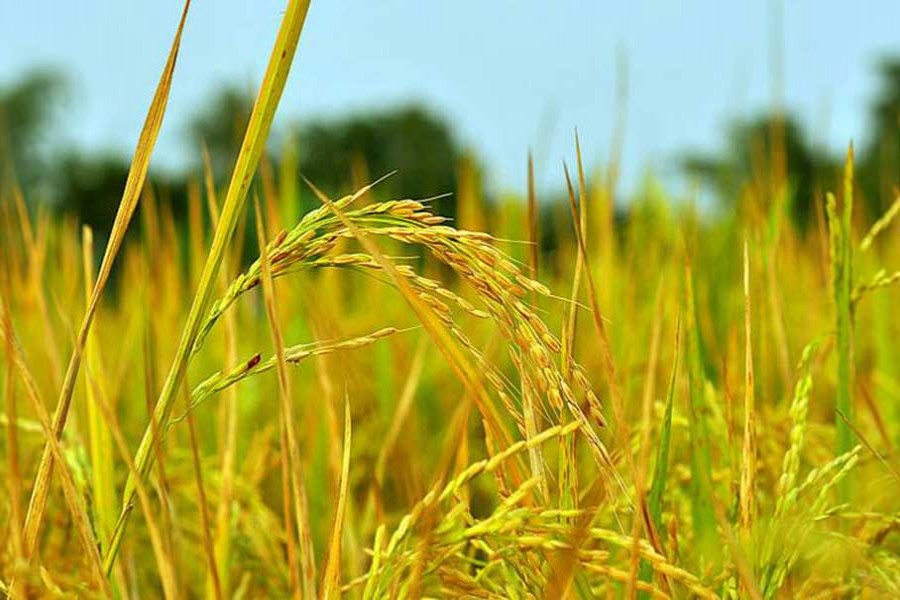How quickly things change! Barely into two weeks following the government's announcement about the country's food security situation - set to receive a boost by good Boro harvest and plans for quick and sufficient procurement - reports published in the newspapers reveal a frustrating picture of the state of procurement. Until last week, reportedly, less than 1.0 per cent of the procurement target has been met.
The food department has, so far, been able to procure very little quantity of the targeted purchase of paddy and rice this season in more than a month of the commencement of country-wide procurement programme. This, no doubt, speaks of the lacklustre nature of the procurement drive on one hand and failure to put in place effective measures to ease farmers' selling their produce to the government. The report published in a local daily quoting official sources says that until last week, the Directorate General of Food (DGF) purchased only 7,750 tonnes of Boro paddy from farmers, which is less than 1.0per cent of the target of 0.8 million tonnes. The drive, which began on April 26, would end on August 31. As for the purchase of rice from millers, the picture is equally depressing. The authorities succeeded in procuring only 6.0 per cent of the targeted 1.0 million tonnes of parboiled rice from millers since the drive began - that too more than a month ago, in the first week of May.
It may be noted that the agriculture ministry had said last month that the fairly good harvest of Boro paddy is capable of shedding worries about food security in the coming six months. Over and above, the next major paddy crop Amon which is set to be harvested in less than six months and that of Aus, a lesser yielding crop, coming up in 2-3 months from now make it a no-worry situation in so far as food security is concerned for the next one and a half year.
Amid the Covid-19-induced adversities in most sectors of the economy, food security does figure as a major concern given the requirement of massive quantities of rice under the subsidised open market sale (OMS), gratuitous relief operations for the poor and low income population across the country. Replenishment of stock has thus become crucially important. However, in view of the poor progress in procurement, things do not at all seem to be on the right tract.
It has been learnt from news reports quoting food officials that farmers are reluctant to sell to the government and are interested in selling their produce in the market as prices there are higher this season. Also, there is another problem for public warehouses to procure paddy from the farmers as the government's procurement specifications do not allow buying paddy having moisture content beyond a certain level - 14 per cent. If this is the case, one has reasons to believe that the authorities did not do their homework before planning the procurement drive. Clearly, there was deficient monitoring of market prices or speculative prices of paddy before setting the procurement price. Data of the Department of Agricultural Marketing show prices of coarse paddy rose 51 per cent to Tk 770 each maund (equivalent to 37.5 kilograms) on June 3 this year from a year ago. As regards moisture content, it is pretty well known that farmers do not bother to dry their paddy sufficiently enough to match the government's specifications for procurement. All they are interested in is fair price, where ever available. It is thus difficult to say how far the food department can go given the present pace of procurement.
The government started procuring paddy and wheat from April 26. The total target of procurement is 0.8 million tonnes of paddy and 1.15 million tonnes of milled rice. The government has the capacity to store 1.93 million tonnes of food grains in its warehouses. According to statistics, Bangladesh had a supply of 37.3 million tonnes of food grains (rice and wheat) from May 2019 to last month, and the country consumed around 35.8 million tonnes of food grains last year. According to food ministry data, food stock at the government warehouses dropped to 1.13 million tonnes on June 3, down 16 per cent from the same day a year ago.
The situation is far from rosy. The DGF office has directed its field offices to gear up efforts to achieve previously set target of buying 60 per cent of the Boro paddy by June, 90 per cent by July and 100 per cent within mid-August before the drive ends. It fixed the target last month and asked field offices to work to achieve the targets.
In this regard, one must not miss out the fact that although government procurement to build stock is not satisfactory as of now, farmers are getting fair prices, which is a good news. However, for the government to meet exigencies, building stock for the unforeseeable future is a must, and all out efforts should be in place to meet the target, if necessary, through readjusting prices and procurement specifications.


